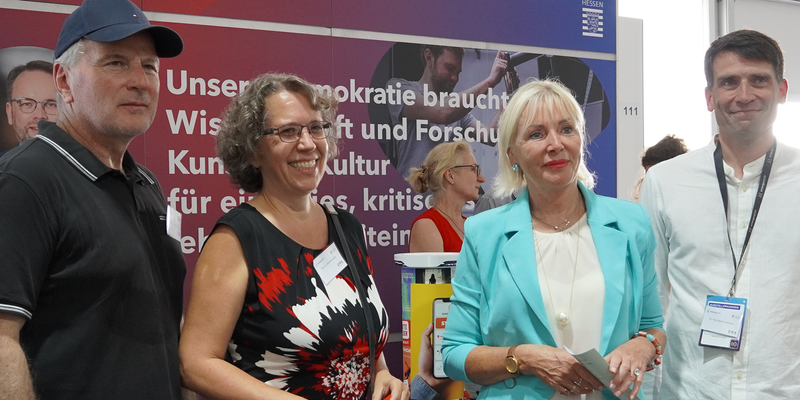Digital Resilience Xchange (DiReX) starts
The new Application and Transfer Center at TU Darmstadt puts emergenCITY research into practice.
The new Application and Transfer Center at TU Darmstadt puts emergenCITY research into practice.

Hesse is further expanding its pioneering role in the field of digital resilience: With the approval of the new Digital Resilience Xchange (DiReX) application and transfer center at the Technical University of Darmstadt, a key building block is being created to make digital infrastructures in Germany more secure and resilient. The project is being funded with around two million euros from the Hessian Ministry for Digitalisation and Innovation’ Distr@l funding program, around two million euros from the European Regional Development Fund (ERDF), and around one million euros from TU Darmstadt.
“With DiReX, we are making a targeted investment in the future viability of our state. Thanks to EU and state funding, a center is being created here that strengthens digital resilience in a scientifically sound and practical way. It is also a further building block for a national center for digital resilience and highlights how important the connection between research, business, administration, and society is for our security. This makes Hesse once again a pioneer,” explained Digital Minister Prof. Kristina Sinemus.
TU President Prof. Tanja Brühl emphasized: “DiReX is a shining example of how we at TU Darmstadt successfully translate cutting-edge interdisciplinary research into concrete applications. DiReX is living xchange for innovation: In close dialogue with diverse partners, scientific innovations become powerful solutions for urgent challenges of change. As a university, we are thus making an important contribution to strengthening the resilience of our society in many areas.”
At the heart of DiReX is the development of innovative information and communication technologies (ICT) that keep critical infrastructures, from energy to communications, functioning in the event of a crisis. “DiReX is not just about technology. Our goal is also to strengthen the resilience of society as a whole. That’s why we actively seek dialogue with many partners, from government agencies and aid organizations to businesses and civil society,” Prof. Michèle Knodt, Professor of Political Science at TU Darmstadt, deputy emergenCITY coordinator, and one of the two directors of DiReX, said.
DiReX’s work is based on three central foci. The center consistently focuses on interdisciplinarity: Computer science, engineering, architecture, law, and social sciences work closely together to holistically address the complex challenges of digital resilience. Furthermore, DiReX promotes cooperation with partners from politics, administration, business, aid and rescue organizations, and civil society. Finally, Xchange is at the heart of the project: research results are not left in the laboratory, but are directly applied through living labs, demonstrators, start-up support, and continuing education opportunities.
“With living labs and demonstrators, we can test digital solutions under real-world conditions and further develop them together with partners. This creates direct added value for administration, business, and society,” Prof. Bernd Freisleben, DiReX Director, emergenCITY-PI, and Professor of Computer Science at the University of Marburg, pointed out.
DiReX builds, among other things, on the research findings of the LOEWE Center emergenCITY, also a basic research project funded by the State of Hesse. Among other things, the Advertising Column 4.0 prototype has already been put into operation there. It operates autonomously for up to 72 hours during a prolonged power outage, ensuring continuous information for the population in the event of a crisis. Important information was also displayed on this advertising column on the nationwide warning day on September 11th to test the existing warning infrastructure. “It is very gratifying to see that the state’s investments in the LOEWE Center emergenCITY are now bearing fruit. It demonstrates the important role our universities and non-university research institutions play in meeting the challenges of our time,” said Timon Gremmels, Hessian Minister for Science and Research, Arts and Culture.
Source: Press release from the Hessian Ministry for Digitalisation and Innovation